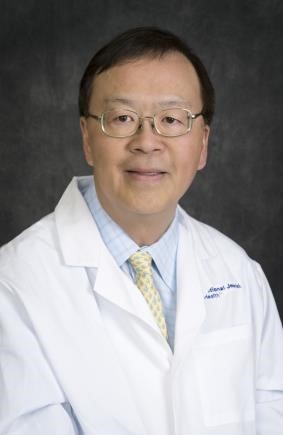AAAAI Foundation and Donald Y. M. Leung, MD, PhD, FAAAAI -JACI Lecture: Investing Together in Our Future
 Dr. Donald Y. M. Leung, was the Editor-in-Chief of the Journal of Allergy and Clinical Immunology (JACI) and served for 17 years. Under his leadership, the impact factor of our journal has risen from 3.7 to over 11.0, reflecting a marked improvement in publications of research dedicated to the diagnosis and treatment of allergic and immunologic diseases. JACI is the most highly cited Journal in the field of Allergy, Asthma and Clinical Immunology and is the most visible official publication of The American Academy of Allergy, Asthma and Immunology (AAAAI). Dr. Leung stepped down from his Editor-in-chief position in spring of 2015. As one of his initiatives to support and enhance research in our specialty and maintain JACI’s high impact factor, he proposes to establish a new 4 million dollar research fund.
Dr. Donald Y. M. Leung, was the Editor-in-Chief of the Journal of Allergy and Clinical Immunology (JACI) and served for 17 years. Under his leadership, the impact factor of our journal has risen from 3.7 to over 11.0, reflecting a marked improvement in publications of research dedicated to the diagnosis and treatment of allergic and immunologic diseases. JACI is the most highly cited Journal in the field of Allergy, Asthma and Clinical Immunology and is the most visible official publication of The American Academy of Allergy, Asthma and Immunology (AAAAI). Dr. Leung stepped down from his Editor-in-chief position in spring of 2015. As one of his initiatives to support and enhance research in our specialty and maintain JACI’s high impact factor, he proposes to establish a new 4 million dollar research fund.
The “Donald Y. M. Leung, MD, PhD, FAAAAI-JACI Lecture” commemorates the initiation of this effort and the opportunity to advance the knowledge and/or treatment of allergy, asthma and immunology by providing a source of funding for future research. The vision is to support quality, cutting-edge translational and basic research suitable for publication in JACI and further advance patient care and the credibility of allergy/immunology.
2020 marks the 8th year of the AAAAI Foundation and Donald Y. M. Leung, MD, PhD, FAAAAI-JACI Lecture: Investing Together in Our Future.
Xin Sun, PhD
Professor, Department of Pediatrics, U. California-San Diego
 My research interrogates the genetic mechanisms of lung development and associated diseases. Past work contributed to understanding of other key developmental processes including limb patterning, gastrulation and somitogenesis. For our current focus on lung, we have investigated the function of a broad spectrum of molecules, including extracellular signals (FGFs, WNTs, HHs, BMPs, SLIT and their corresponding receptors), cytoplastmic effectors (Dicer, microRNAs, E3 ubiquitin ligases), and nuclear transcription factors (ETVs, TWIST, HAND2, SOX2 and ASCL1). The array of lung diseases that we have studied include rare lung diseases such as congenital diaphragmatic hernia (abdominal organs in chest), neuroendocrine cell hyperplasia of infancy (increased neuroendocrine cells and reduced pulmonary function), tracheobronchomalacia (floppy trachea and bronchi) and tracheoesophageal fistula (persistent connection between trachea and esophagus) and more prevalent diseases such as bronchopulmonary dysplasia (respiratory deficiency due to prematurity), pulmonary hypertension and asthma. We have established genetic pipelines to efficiently interrogate whether patient-specific genomic variants are disease causal by generating mice carrying these mutations using CRISPR/Cas9-based genome editing.
My research interrogates the genetic mechanisms of lung development and associated diseases. Past work contributed to understanding of other key developmental processes including limb patterning, gastrulation and somitogenesis. For our current focus on lung, we have investigated the function of a broad spectrum of molecules, including extracellular signals (FGFs, WNTs, HHs, BMPs, SLIT and their corresponding receptors), cytoplastmic effectors (Dicer, microRNAs, E3 ubiquitin ligases), and nuclear transcription factors (ETVs, TWIST, HAND2, SOX2 and ASCL1). The array of lung diseases that we have studied include rare lung diseases such as congenital diaphragmatic hernia (abdominal organs in chest), neuroendocrine cell hyperplasia of infancy (increased neuroendocrine cells and reduced pulmonary function), tracheobronchomalacia (floppy trachea and bronchi) and tracheoesophageal fistula (persistent connection between trachea and esophagus) and more prevalent diseases such as bronchopulmonary dysplasia (respiratory deficiency due to prematurity), pulmonary hypertension and asthma. We have established genetic pipelines to efficiently interrogate whether patient-specific genomic variants are disease causal by generating mice carrying these mutations using CRISPR/Cas9-based genome editing.
More recently, we have initiated work to investigate neuronal control of lung function. In addition to research, I have devoted substantial effort to teaching and mentoring, on campus, nationally and internationally. I served as Director of the Cold Spring Harbor Laboratory summer course on Mouse Stem Cells, Development and Cancer, a flagship course in the mouse research field that has an over 30-year distinguished history.
APPOINTMENTS/POSITIONS
2002-2009 Assistant Professor, Laboratory of Genetics, U. Wisconsin-Madison
2010-2014 Associate Professor, Laboratory of Genetics, U. Wisconsin-Madison
2014-2016 Professor, Laboratory of Genetics, U. Wisconsin-Madison
2016-present Professor, Department of Pediatrics, U. California-San Diego

 Facebook
Facebook X
X LinkedIn
LinkedIn Forward
Forward